|
Cecil Square
Margate
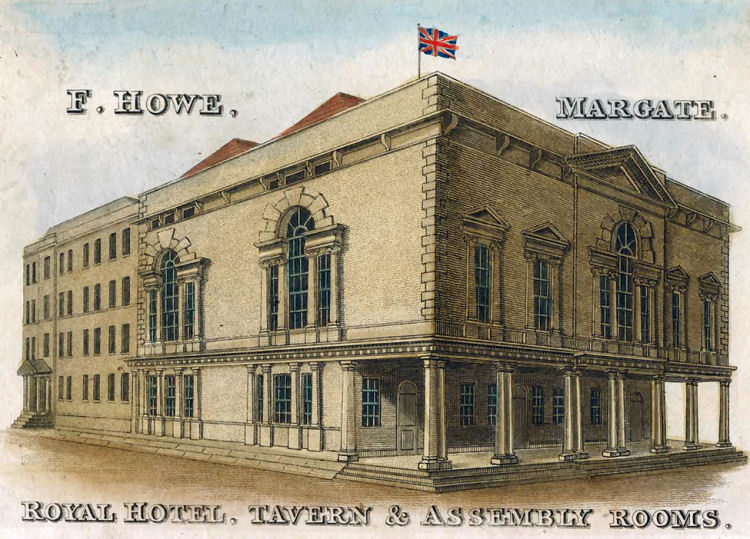
Above engraving, circa 1830s. |
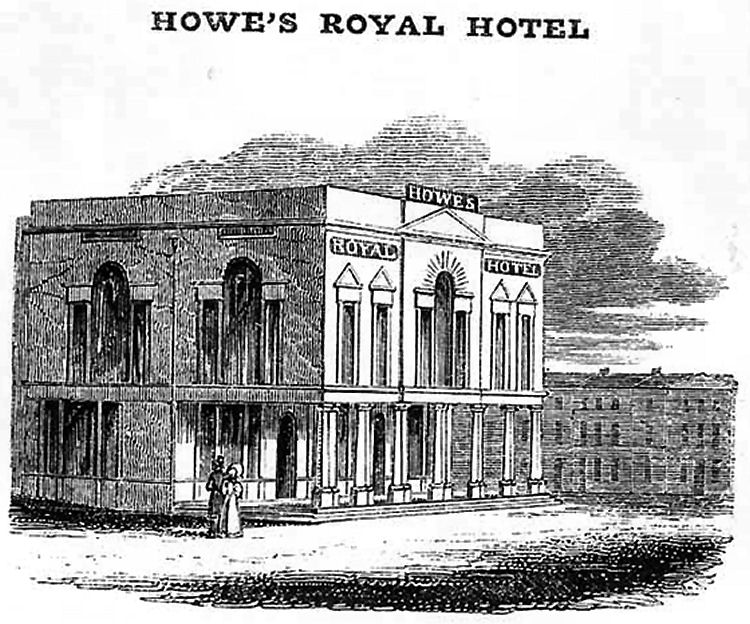
Above engraving circa 1853.
|
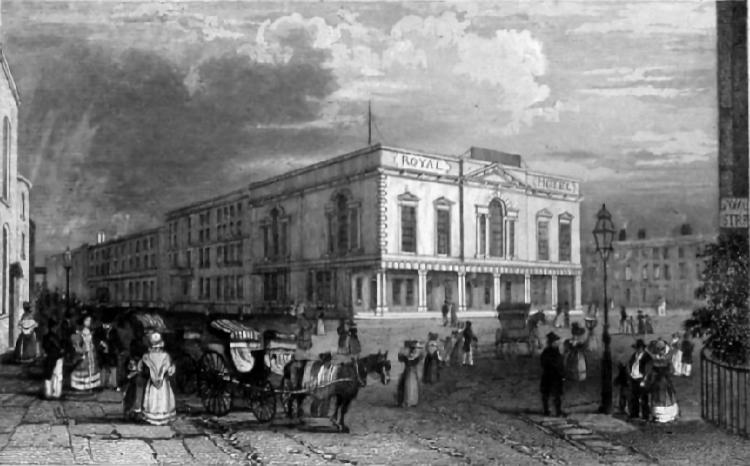
Above print, circa 1850. |
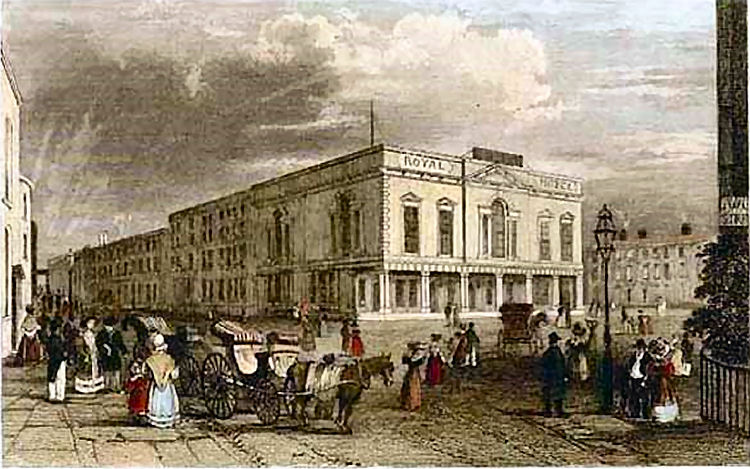
Above print 1850.
|
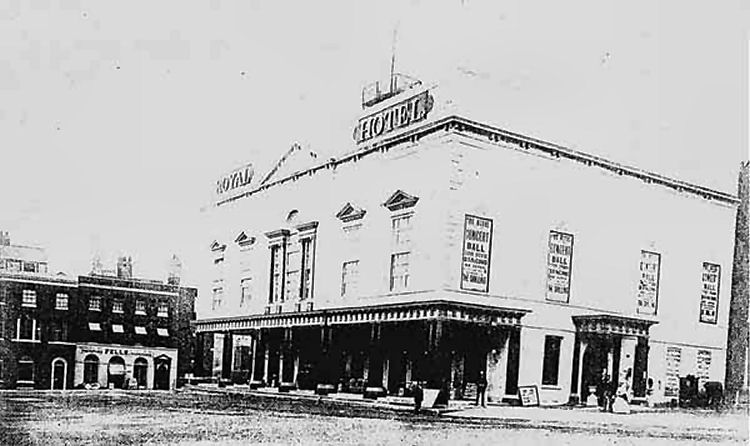
Above photo date unknown. |
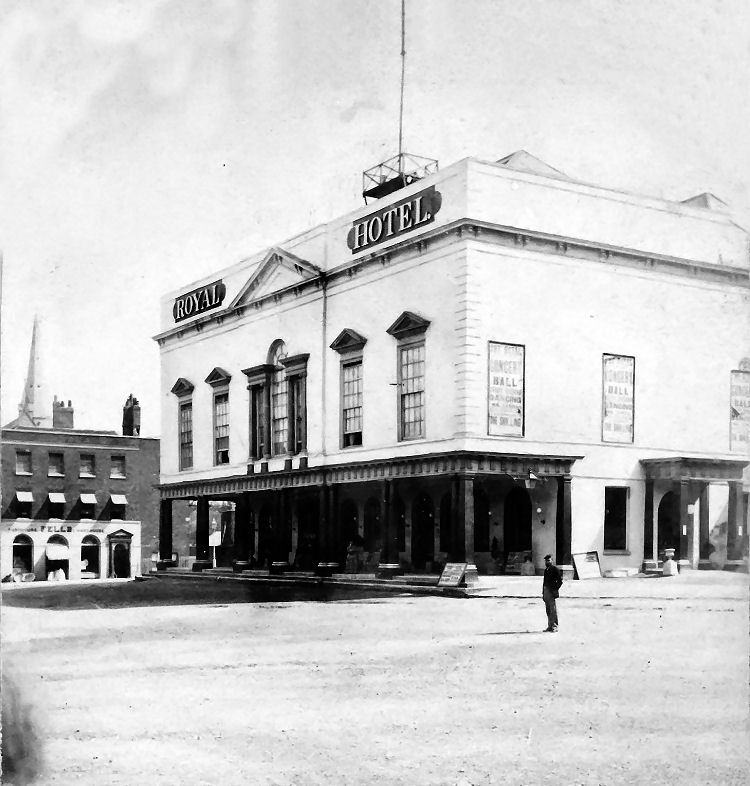
Above picture taken from a stereo card, date unknown. |
Opened in 1769, this new hotel and assembly room had been built in New
Square, later named Cecil Square. This new hotel was originally known as
"Smith’s Hotel," then as "Fox’s Hotel," "Smith’s Tavern" and "Benson’s
Hotel," before finally changing name after 1794, to the "Royal Hotel."
|
Kentish Gazette, 27 February, 1779.
To be Let, and entered upon immediately.
For a term of years, if required.
All that well-known Tap-room ready furnished with the vaults, &c,
belonging to the Hotel or New Assembly Rooms in Margate.
It is not necessarily to point out the many good qualities that a
person should possess in order to render the employment advantages
to him. And as to the peculiar situation of the Tap, under Person's
so capable as Messrs. Smith and Benson, for an extensive trade,
there is no occasion to enlarge on; the former being so well known,
after long experience, for giving universal satisfaction in one of
the first Taverns in London as well as in Margate.
The Army are not to be any Charge or Burthen to the Tap-keeper.
For further particulars enquiry of Messrs. Simmons and Kirkby.
|
|
Kentish Gazette, Tuesday, 19 April, 1796.
To be Sold by auction.
AT Mr. BENSON’S HOTEL, in MARGATE, on Thursday the 21st day of April
instant, about six o'clock in the evening, the following FREEHOLD
ESTATES:
Lot 1. A convenient modern-built brick dwelling house, and garden, late
in the occupation of Mr. Richard Field Smyth, wine merchant.
Lot 2. A convenient modern-built brick dwelling house, and garden, in
the occupation of Mr. Arnold; four small tenements, in the occupation of
John Mantell and others; two stables, and two coach houses.
Both the above lots are situate in Prospect Place, on the on the
East-side of the Church Field, Margate.
Lot 3. Two duelling houses, one of them newly built, and two stables,
adjoining, situate on the North-side of Love Lane, in Margate; in the
occupation of John Freckson, James Hopper, and others.
At the same time and place, will also be sold, (unless sooner disposed
of by Private Contract.)
The Good-Will of an House, with a grocer's shop, in full trade, in
Broad-Street, near the Market Place, in Margate, now in the occupation
of Mr. John Mepham; the purchaser taking the present stock, at a fair
valuation.
For further particulars, enquire of Mr. Sawkins, Margate.
|
|
From the Morning Post and Gazetteer (London, England,) Saturday, January 24, 1801.
ROYAL HOTEL, TAVERN, AND ASSEMBLY-ROOMS, MARGATE.
Benjamin Kidman most respectfully informs the Inhabitants and Company
frequenting Margate, and its vicinity, that he has taken the above
Premises, and humbly solicits their favours and support, assuring them
no exertion shall be wanting to render the accommodation as commodious
and agreeable as possible.
A general knowledge of the Hotel and Tavern
business will fully enable him to conduct it upon such principles as, he
hopes, will meet with the approbation of those who may please to honour
him with their favours.
Likewise being supplied with Port of the Company's importation, he
assures his Friends of being served with that article not inferior to
any in the trade; also Wines of every other description, of first
quality; Brandy, Rum, etc. sent to any part of the Island, carriage free
of expense. - Good Stabling, Post-Chaise, Glass Coaches, etc. etc.
|
|
From the Kentish Gazette, 23 March 1810.
ROYAL HOTEL MARGATE, TO BE LET, TOR A TERM OF YEARS,
THE "ROYAL HOTEL" at Margate, in the Isle of Thanet, now in the
occupation of Mr. Benjamin Kidman — comprising large and elegant
Assembly Rooms, Coffee Rooms, Billiard Room, and every requiste
convenience for carrying on an extensive Tavern business.
The premises may be viewed by leave of the tenant, and further
particulars may be known by application al the office of Messrs.
Williams and Walker. Dartford.
|
|
From the Kentish Gazette, 21 August 1810.
ROYAL HOTEL, MARGATE.
TO BE LET, FOR A TERM OF YEARS, THE "ROYAL HOTEL" at MARGATE, in the
Isle of Thanet, now in the occupation of Mr. Benjamin Kidman;
comprising large and elegant Assembly Rooms, Coffee Room, Billiard
Room, and every requisite convenience for carrying on an extensive
tavern business.
The premises may be viewed by leave of the tenant; and further
particulars may be known by application at the Office of Messrs.
Williams and Walker, Dartford.
|
|
From the Kentish Gazette, 27 November 1810.
MARGATE.
Benjamin Kidman, late of the "Royal Hotel," begs leave to return his
most grateful thanks for the many favours conferred on him during
the time he was in that house.
B. K. begs most respectfully to announce to his friends that he has
removed to those premises occupied by his late uncle. Mr. JOHN
BENSON, No. 53, Hawley Square where he continues the WINE and SPIRIT
TRADE wholesale and retail — humbly soliciting a continuance of
those favours he has so many years experienced. November 14, 1810.
"ROYAL HOTEL," MARGATE.
FRANCIS HOWE, (late Waiter at the above House, and at Wills’s, St.
James’s Street, London) begs have most respectfully to Inform the
Nobility and Visitants of Margate, that he has succeeded Mr. Kidman
in the above House; and assures those; who may honour him with their
favours, that every exertion shall be used on his part to merit
their patronage and support.
F. H. has been particularly choice in selecting Wines, and every
other article, of the first quality.
|
|
Kentish Weekly Post or Canterbury Journal, Friday 22 March 1811.
DEATH
March 16, at Margate, Mr. ------- Irish, many years landlord of the Tap
at Kidman's Hotel.
|
|
Morning Post 01 July 1823.
MARGATE, JUNE 29.
This place has felt the backwardness of the season in the absence of its
accustomed visitants; but, if the company has not been so numerous, it
has been more select. Among the arrivals at the "Royal Hotel" are the Duke
and Duchess of Rutland, Mr. Irving, M.P., The Earl of Winchelsea, Mr.
Finch, Mr. Harman, the Hon. George Watson, Sir John Palmer, the Hon. G.
F. Milles, the Rev. Wheeler, Capt. Donellan, etc; and the "York Hotel"
boasts as fashionable a list. The steam-boats are now bringing large
importations, and the lodging-houses are filling fast, A new range of
buildings have been erected since last year on the Fort, which, from the
extensive prospect they enjoy, are in universal request.
|
From the Kent Herald,
14 March 1833.
Nisi Prius. Thursday. Before the Lord chief justice Tyndall.
Lomax v. Passmore.
For the plaintiff, Mr. Platt and Mr. Thesiger; for defendant, Mr. Sergeant Spankie.
Mr. Platt addressed the jury, and stated the facts of the case to the following effect. He regretted that he had to lay before the jury in the present case the circumstances of a quarrel between two persons, moving in the rank of gentleman, one of whom brought this action before an aggression on the person of the other. It might be easily supposed that a matter of this sort would exercise some feeling, especially when it was known that the defendant was a gentleman at the bar. The plaintiff was the son of General Lomax, the brother of officers in the army, and moving in the rank of a gentleman.
On the 22nd of September last, he was sitting in the public coffee rooms of Howe's Hotel, Margate, taking his wine,
in company with other gentlemen. After some wine, and when probably the party were somewhat heated with wine, Mr. Passmore came in, and insisted on settling an old dispute between himself and one of the party. Efforts were made to induce him to desist, but he persisted in his intrusion, and consequently disturbed the harmony of the party. The plaintiff felt very indignant, and expressed himself angrily, and perhaps strongly, on which Mr. Passmore struck him violently in the face, repeated his blows and felled him to the ground. Mr. Lomax was covered with blood, and he was taken away by some persons who came up. The next morning, feeling that there was only one cause of proceeding after such an outrage, though he (Mr. Platt) could not say the law sanctioned such a proceeding; Mr. Lomax called upon a friend to procure from Mr. Passmore such an explanation as is well understood in such cases. The treatment that friend experienced was altogether unworthy the character of a gentleman. A letter was then sent, which was returned on opened. Mr. Lomax upon this made no secret of what had taken place, but published an account of the affair for the vindication of his character. Shortly after, while Mr. Lomax was at Bettison's Library, at 10 o'clock in the evening , in company with his wife and two other ladies, a gentleman came up and said Mr. Passmore wanted to speak with him. Mr. Lomax replied that Mr. Passmore could speak with him as well there as anywhere elsewhere. Mr. Passmore immediately came up and presented a pamphlet, asking Mr. Lomax if he were the author. He replied he was, and Mr. Passmore at once began to horsewhip him in the presence of his wife, and other ladies, and in a place where it could not be supposed a man could condescend to such conduit.
Mr. Platt then called the persons who were present on each occasion, to prove the facts. It appeared that the party assembled on the first occasion consisted of Mr. Strachan, a linen Draper, Mr. O'Brien, an officer, Mr. Ellis, a Taylor, and Mr. Lomax.
Serjeant Spanky made a very humorous address to the jury in behalf of the defendant in which he regretted that an occurrence had taken place between the parties more consistent with animals of strength than animals of reason. He would not attempt a justification of his client's conduct, but would adduce some circumstances in
palliation. He proceeded to comment on the state of intoxication, in which it had been proved the plaintiff was at the time of the first assault, and entered into an indescribable ludicrous examination of the different degree of drunkenness from being "drunk like a gentleman, to being drunk like a sow." He then ridiculed the folly of some persons in certain conditions of life, resulting to the law of honour on every trivial occasion and related a funny story of a dealer in crockeryware, who being extremely important, that a gentleman of the law should "meet him," was answered, if it was not for the ridicule of the thing, I should like to have a crack at your crockeryware (Loud laughter.) In conclusion he contended that this was not the case demanding heavy damages. The jury would weigh well the real nature of the injury. When men conduct themselves well, and are treated with indignity they deserve relief; but when they contribute themselves to the injury they receive, it matters very little who has the right hand of the law, but the real instigator of the outrage should be visited with punishment.
Mr. O'Brien was then called to prove that on the first occasion, Mr. Lomax called Mr. Passmore "a bloody liar."
Mr. Platt having replied, his lordship summed up, and observed, that what they had heard in
palatium was no justification to the act itself. The jury must weigh well the circumstances, and gives such damages as the case required.
Verdict for plaintiff:- Damages £50.
|
|
From the Kent Herald, 7 November 1833
Margate. A Swindler.
On Friday the 25th ult, a well-dressed gentlemanly man calling himself
Captain Henry Bowden, of the Guards, arrived by one of the London
coaches at the "Royal Hotel", Margate, and after remaining several days,
took a house on the Marine Parade. He in vane endeavoured to persuade Mr.
Howe to cash a £30 bill for him, and after borrowing £2 off the female
who had the care of the house, he got off on Friday last by the London
coach. On Saturday morning the cheque which Mr. H. had sent to London
for him was returned, with "No Effects," endorsed thereon. This
gentleman is about five feet nine inches in height, of fair complexion
and ruddy, has dark hair and eyes, and appears to be between 30 and 40
years of age. It is needless to add that he forgot to pay his bill at
the hotel and other places in the town.
|
|
Kentish Gazette 31 December 1839.
The first meeting of the Margate Catch Club will be held at the "Royal
Hotel," on Friday Evening, January 3d, 1840. The Chair to be taken at
Eight o'clock precisely, when Visitors and Friends are respectfully
invited to attend.
T. Lansell, Secretary.
|
|
From the Kentish Gazette, 19 December 1843.
MARGATE.
The inhabitants of this place are quite delighted to hear that the
"Royal Hotel" (which has been a long time shut up) is again let on a
long lease, and on such terms, as combined with moderate charges, will
ensure its success.
|
|
From the Kentish Gazette, 5 August 1845.
MARGATE. Assembly Rooms, "Royal Hotel."
We are happy to see the spirit with which the spacious assembly rooms of
the "Royal Hotel" have been opened this season. Mr. Gardiner, as might
he expected, from his skill and knowledge of music, has selected a
splendid band. On Monday evening the rooms were opened, and from 300 to
400 persons attended. It was no small pleasure to the well-wishers of
the town, to see many of the wealthiest and most influential inhabitants
present. The performances of the evening were much superior to anything
that has been witnessed in the town for some time past. The singing of
Miss Muriall O'Conner was well received, she displayed some ability in "Wha'll
be King but Charlie." The accompaniment of Mr. J. L. Hatton was very
melodious. To lovers of the flute, a rare treat was afforded by Mr.
Winterbottom, who showed himself a perfect master of that instrument,
and received much applause. The selections from Norma were brilliantly
executed. During the week the rooms have been attended by a numerous and
very respectable company, notwithstanding the attraction of Mr. Hughes's
circus. The visitors and inhabitants appear to appreciate the exertions
of Mr. Gardiner, and the ability of his orchestra.
We cannot help noticing that this place is assuming its former gaiety.
Those who are anxious for a change of air, and wish to retreat to some
watering place, will fail in finding one on the island possessing
greater attractions than Margate, which abounds with pleasant walks and
fresh and pure air. Be the visitors weak and in ill health, they may
secure a good bathing place and reap great benefit, and ultimately
become strong — if they desire a change of scene, it may be found in the
Boulevard and Bazaars, where their fortune may be tried at the wheel of
lottery, or the throwing of dice — even many a merry hour may be spent
in listening to the old bell man, who is ever ready to cry at others
losses to his own gain — if their taste be for singing, music, and
dancing, they have only to cross over to the Assembly Rooms, where, for
one shilling, Mr. Gardiner will give them a grand entertainment — if
they desire a more rural retreat, they will make their way for Tivoli
Gardens, which abounds with pleasant walks, and where they will be
delighted with a grand display of fireworks, there they may also study
to perfection the light fantastic toe and hear music and singing; they
may also enjoy a good game of archery, or a row in the boat on the lake,
and when evening's dark clouds come over, they will behold the walks and
gardens most brilliantly lighted up with thousands of variegated lamps,
as to remind them of Vauxhall in its olden time; and lastly, many an
evening’s amusement will be found at the Theatre Royal, which opened on
Monday, under the management of Mr. Coombes, supported by a large and
efficient company of actors and performers; besides which the company
will observe that there is a cheap steam-boat running to this place, and
which has already introduced amongst many others, Mr. and Mrs. Caudle
with their family, to this favourite spot, and they have already come to
the determination of giving it in future their cordial patronage and
support — they will occasionally be met with at the Tivoli Gardens,
where every preparation is made for their reception. There are also many
harmonic meetings, where a professional singer is engaged to take the
chair.
The Margate Pier and Harbour Company have engaged a band to play on the
high pier. This we have no doubt will induce many to resume their walk
on that promenade, and increase the numbers materially there.
The boats continue bringing great numbers to this place. Nearly all the
respectable lodging-houses are full.
|
|
From the Kentish Gazette, 1 December 1846.
MARGATE. THE OPENING OF THE SOUTH EASTERN RAILWAY.
The dinner at the "Royal Hotel," on Tuesday (this day), is expected to
be on a magnificent scale. The large ball room is fitted up in great
style for the occasion with banners, evergreens, and flowering shrubs.
Upwards of 150 of the leading gentlemen of Margate and the vicinity have
enlisted their names as participates of the festivities of the day, and
the prospects of the coming event casts sunshine instead of shadows
before.
|
|
Kentish Gazette, 21 December 1847.
ASSEMBLY ROOMS, ROYAL HOTEL, MARGATE.
THE Nobility and Gentry are roost respectfully informed, that a BALL
will take place at the above Rooms, on TUESDAY, the 4th of January,
1848.
STEWARDS.
Lieutenant-Colonel STOTT. W. BROOKE, Esq. HARVEY BOYS, Esq.
Ladies’ Tickets, 5s., Gentlemm’s, 6s., tea and coffee included.
|
|
From the Kentish Chronicle, 19 March, 1864.
ANSELL v. WYATT.
This was an action to recover damages for an assault, at Margate.
Mr. Hawkins, and Mr. Prentice were for the plaintiff; but no appearance
was put in on the part of the defendant.
Plaintiff deposed:— I am a billiard-table keeper at the “Royal Hotel.” I
take it of Mr. Gardner, and have done so for the last seven years. On
the 20th September defendant came to my billiard-room, while several
gentlemen were playing. He commenced making a noise, and insulted the
gentlemen there, saying he would fight any two of them, he was not
tipsy, though he had been drinking. As he refused to leave I sent for a
policeman. He still refused to go, and the officer at last carried him
out. In about an hour, or an hour and a half, he returned with a young
man named Friswell and both of them made a fresh disturbance. I sent for
Mr. Gardner. Friswell kicked me, and afterwards knocked me in the mouth.
Wyatt then struck me on the check and ear with a stick, cutting my head
open. Both of
my eyes were blackened, and my face was scratched, and my nose bled. On
the following morning I was served with it summons for assaulting him,
the summons being taken out in the name of Brown. Wyatt was in the
billiard-room at the time it was served. No one appeared to the summons.
P.C. Hobday, of Margate, said he was sent for to the “Royal Hotel” on
the evening in question, and was compelled to carry the defendant out of
the room. He promised that he would not go back.
Mr. Simes said he was at the billiard room of the plaintiff, and
confirmed the statement of the previous witness as to the disturbance
made, and the assaults committed.
Dr. Innis, who was also at the billiard-room, further corroborated the
previous testimony.
The jury, having consulted a short time, the foreman asked whether it was
not the fact that another billiard-room had been started since this
occurrence?
The plaintiff said that was so.
The jury then returned a verdict for plaintiff for £50 damages.
|
The premises was built in 1769 and destroyed by fire on 27 October 1882.
|
Whitstable Times and Herne Bay Herald 1882.
MARGATE. GREAT FIRE.
A destructive fire occurred at Margate early on
Saturday morning, with the result that the whole of the south side
of Cecil-square has been gutted. The fire broke out in the Assembly
Rooms, occupied by Mr. H. E. Davis, captain of the Fire Brigade, well
known as the once favourite resort of George IV. An electioneering
meeting in support of Captain Davis' candidature for the Town
Council had just previously been held. Flames were seen issuing from
the Assembly Rooms roof, which quickly spread, a strong wind blowing
at the time. The "Royal Hotel" adjoining, and a ladies' large school
belonging to Miss Smart, with four other large houses completing the
square, one being the Vicarage and two others occupied by Captain Swinford and by Mr Cobb, head of the banking firm of Cobb and Co.,
were speedily in flames. The vicar and his family escaped only in
night dresses and overcoats. The Margate, Westgate, Broadstairs, and
Ramsgate engines were soon on the spot. One of the Ramsgate Brigade
men, named Brookman, fell from a ladder, and was so seriously
injured that he had to be conveyed to the Cottage Hospital.
The fire was discovered by some Freemasons when leaving their Lodge
opposite the Assembly Rooms. They awakened the proprietor, and going
into the yard, they found the little lodge full of smoke. The
instant they opened the door the flames shot to the roof. Before
maroons at the police-station could be found to call together the
Fire Brigade the side of the Rooms facing Queen-street was ablaze.
In half an hour the whole of the building was in flames, the gale
which was blowing carrying the sparks as far as the railway station.
The wind blew strongly in that direction, rendering the efforts of
the Fire Brigade almost useless, and it was feared at one time that
the whole of Queen-street and Wellclose-square, together with a
portion of High-street, would be destroyed. Fortunately the gale
moderated, while the heavy rain which fell assisted the firemen in
their work. The fire was eventually extinguished, although it was
found necessary to partially blow up and pull down a house situated
between Mr Cobb's and the first house in Queen-street, to prevent
the spreading of the flames. The damage is estimated at from £60,000
to £70,000. The premises are insured for £27,000, and the contents
for £16,000, being about two-thirds of the damage that has been
sustained. The Sun Office is the principal loser, the remainder
being divided between the North British, Norwich, Law, Liverpool,
and Globe Offices.
Fresh outbreaks of the fire kept the firemen at work to Sunday
evening, the brigade and the police having been on continuous duty
since midnight on Friday. About forty people are homeless, and have
lost nearly everything except the clothes they are wearing. The
coastguard men have demolished the tottering walls which blocked
Queen street. The scene of the fire was visited on Monday by
thousands of people, visitors coming for the purpose from Canterbury
and Deal.
|
|
From the
https://www.margatelocalhistory.co.uk accessed 11 January 2021.
The Report in the Daily News stressed the past history of the
Assembly Rooms:
The destruction by fire of the old Royal Assembly Room in Margate
will be regretted by visitors who have a kindly eye for
associations with the past. It was erected in 1769, together, as an
adjoining mural tablet records, with the solid, comfortable-looking,
red-brick houses of "Cecil-square," of which the Assembly Room
formed one side. This spot, now hidden away behind the houses in the
upper part of the town, was long afterwards the very centre of the
life and gaiety of this seaside resort. As it appeared then so the
Assembly Room continued to appear till the other day, with its
conspicuously broad front and its row of quaint white wooden pillars
extending over the roadway of the square; but its former functions
had suffered decline, and of late it had been mostly used for
occasional concerts and semi-dramatic entertainments. A guide to the
sea-bathing places of England, published in the year of the Battle
of Waterloo, describes its principal room on the first floor as “a
splendid apartment eighty-seven feet long, forty-three feet broad,
and of proportionate height, adorned with busts of his present
Majesty and the late Duke of Cumberland.” It was a cherished
tradition of the place that the "first gentleman in Europe" had more
than once danced a cotillion on its chalked floor; not to speak of
other distinguished though less exalted "votaries" — as our great
grandfathers liked to express it — "of the Terpsichorean art." It
was the understanding that the season could by no possibility
commence earlier or later than the King's birthday, the fourth of
June, and that the last ball night must be in October. Nor was it
less de rigueur that the first dance should commence at eight
o'clock, and that the ball should finish at twelve precisely, even
though that should entail breaking off in the middle of a dance.
Margate was severe moreover in the matter of etiquette; for it was
sternly exacted “that on ball nights no ladies be admitted into the
great room in habits; nor gentlemen in swords, boots, or pantaloons
— military gentlemen only excepted." Those visitors who preferred to
play at whist or quadrille in the card rooms were required in all
cases to pay eleven shillings for two packs of cards, and seven
shillings for a single pack; and on no account was any one permitted
to use a pack left by another party. Those were days when
“excursions” were unknown, and going to Margate, whether by coach or
by the old "Hoy” whose captain and passengers have been so
picturesquely described by Charles Lamb, was a serious business,
implying, as a rule, an intention to make a sojourn of more or less
duration. For such visitors evening amusements were as essential as
the sands and the fresh air for the morning walk. Altogether the old
Assembly Room may be said to have done useful service in its day,
entitling it to respectful sympathy under the calamity that has at
last overtaken it.
|
|
From the
https://www.margatelocalhistory.co.uk accessed 11 January 2021.
The final report, that from the Illustrated Police News, presents a
summary view of the fire:
DESTRUCTION OF THE ASSEMBLY ROOMS, MARGATE.
Seldom if ever, in the history of Margate has such a calamity
visited the borough as that which occurred on Friday week. The
calamity is not only disastrous on account of the amount of property
destroyed, but also on account of the historical link with the past
when perhaps Margate took a higher rank as a fashionable watering
place than she had ever done before, or has ever done since, when
Royalty recruited itself by the pure air, the sea bathing, and the
amusements which were then provided — which, as with a breath, has
been destroyed in one night. To Londoners the Assembly Rooms,
Margate has long been familiar; and from one end of the country to
the other, its fame has spread, while for Margate it has done
perhaps as much as any other places of amusement in providing for
the wants of the visitors seeking relaxations. For that reason alone
the destruction which has overtaken the handsome and familiar rooms
in which it has been the custom to hear the great works of our
greatest masters given in a manner worthy of the works themselves,
and where so many thousands have spent the evening in dancing to the
strains of a first-class band, dinners, and public meetings, and
entertainments of all kinds have for over a century been held, will
excite feelings of deep interest and regret. Unfortunately the
conflagration was not confined to the Assembly Rooms, but spread in
both directions — up Cecil-street and along Cecil-square — until six
houses were included in the mournful catalogue of destruction, and
now the southern side of Cecil-square is a heap of ruins. The origin
of the fire will probably remain a mystery; it is believed that it
may have been caused by some careless smoker emptying his pipe or
throwing away his light either from the billiard-room or from the
lavatory, the entrance to which was under the main staircase, where
it is said that there was a grating over a cellar which contained a
quantity of straw and rubbish. However that may be, when once the
fire had obtained a hold no earthly power could have saved it from
destruction; the building an old one, above the ground floor was of
wood — lath and plaster chiefly — and with such materials to hand
the devouring element had little difficulty in igniting the whole
rooms. A remarkable circumstance connected with the ignition of the
rooms was that the fire passed with such wonderful rapidity against
the wind from the western to the eastern end of the building. But in
addition to there being all the conditions necessary for the
preparation of a great conflagration, the wind was blowing a gale,
carrying the sparks for hundreds of yards to the west, spreading the
flames and the heat to an alarming extent, even to the broiling of
the houses on the opposite side of the square, rendering it
impossible for persons to stand in Queen-street or the Upper
Marine-terrace; while to this must be added, as an aggravating evil,
the alleged shortness of the water supply, which greatly nullified
the efforts of the firemen and their numerous ready and willing
assistants, though undoubtedly the firemen were prevented from using
their appliances with proper effect on account of the amazing heat
which prevented them approaching very close to the flames, and the
strong wind which blew the jets of water away from the blazing mass,
thus leaving the fire to work its way almost unhindered. With
respect to the water supply it is difficult to tell where the fault
lay. The Waterworks department did their utmost, the pumping engines
being at work all night and keeping up the store at 20,000 gallons,
and it is believed that the pressure in the mains was 14 lb to the
inch; the supply to all other districts but those in the immediate
vicinity of the fire was cut off, and so the whole force was
concentrated in two mains, from which however at least a dozen jets
were taken, each of course diminishing the pressure upon the others.
The hydrants, however, were only turned on at two thirds, and even
then the pressure was sufficient to frequently burst the hose while
two engines in the square could not use all the water which ran into
the dam from which they worked. By the time the servants in the
hotel had been awoke, and had thrown some wraps around them, the
smoke in the stairs and passages of the hotel had become so dense
that a candle would not burn, and they had to grope their way out of
the house in the dark, and through the blinding smoke. The inmates
of the hotel were received by Mr. Searles, 12, Cecil-square. In a
very short time the whole side of the rooms facing Queen-street was
in flames. In less than half an hour the whole building, roof and
all, was ablaze, and it was very evident that nothing could save it.
The efforts of the brigade were first devoted to preventing the fire
spreading up Cecil-street, but the paucity of water then did much to
frustrate their efforts. The fire soon spread to the "Royal Hotel" and
to Edgbaston House, so well known as a scholastic establishment for
young ladies, conducted by Miss Smart; the boarders were safely got
out, and after being housed by Mrs. Foord for a time were taken to
the "Grosvenor." Some attempt was made to save some of the furniture,
but this was only very partially successful, only a few books,
papers, and some valuables being saved, and the great bulk of
furniture in both places has been destroyed by fire and water. When
this block of buildings was blazing, the sight was grand in the
extreme — perfectly indescribable in fact — showers of sparks (many
of them a foot in length) filling the air all around and being
carried by the driving wind in fantastic eddies over the western
part of the town, while the glass of the gaseliers and the
looking-glasses which adorned the walls were heard amidst the roar
of the flames to be cracking with a continuous rattle of explosions.
When the great geselier in the centre of the room fell with a crash,
a sensation of horror ran through the crowd, and soon after the roof
and walls fell in with a crash, the dense smoke and blinding showers
of sparks filling the square and making it difficult for a time to
breathe. The fire soon extended to the cellars where the bottles
could be heard for a long time exploding like the firing of
skirmishers in an army. The wall between the rooms and hotel stood
for a long while, but eventually fell with a deafening crash. |
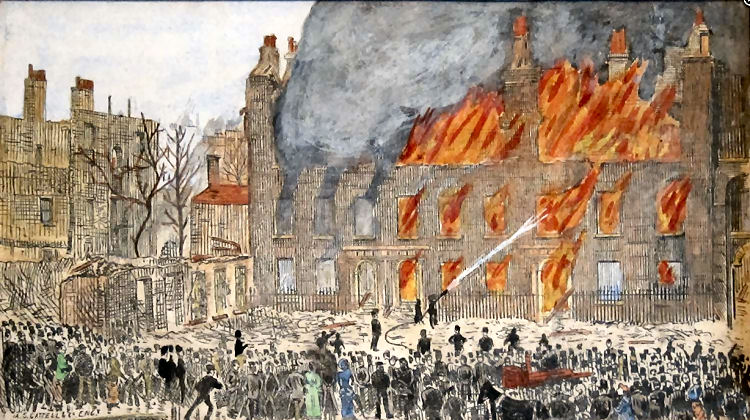
Above print showing the destruction of the Assembly Rooms in 1882. |
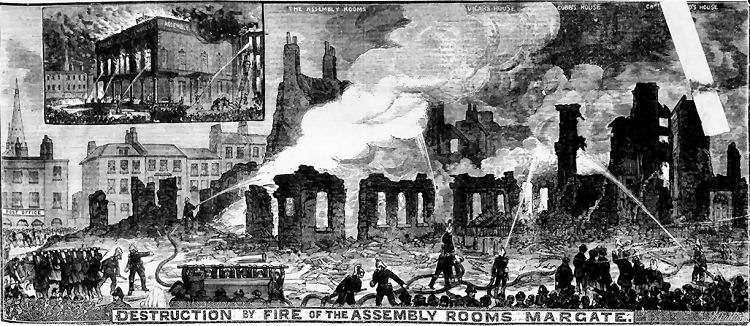
Another print showing the fire destruction in progress, 1882. |
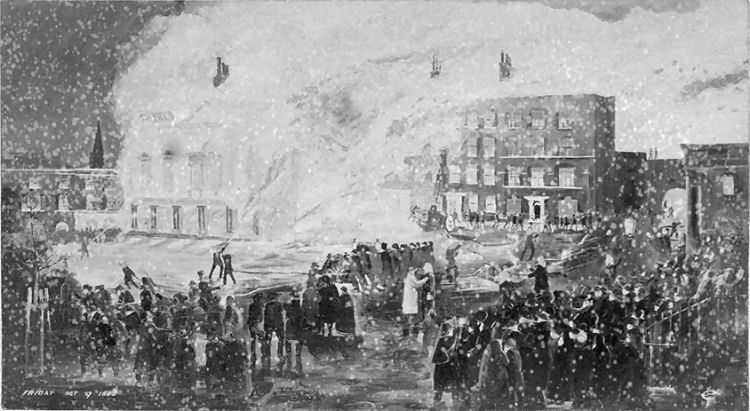
Assembly Rooms fire 27 October 1882. |
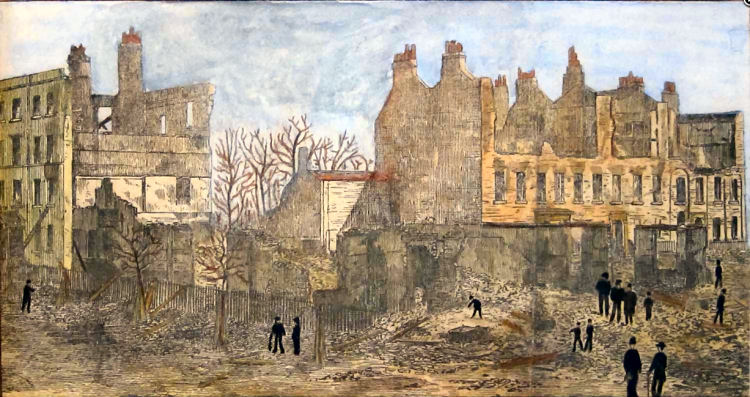
Above painting showing the scene after the fire. |
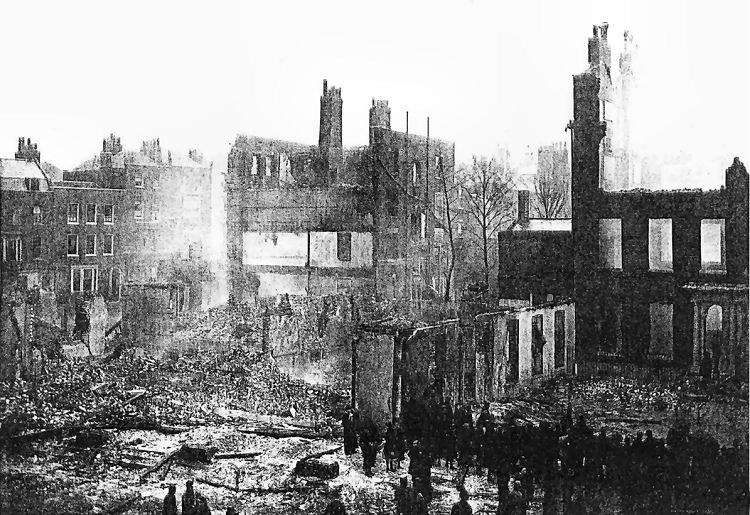
Above photo, after the fire showing the remains of the "Royal Hotel"
on the left. |
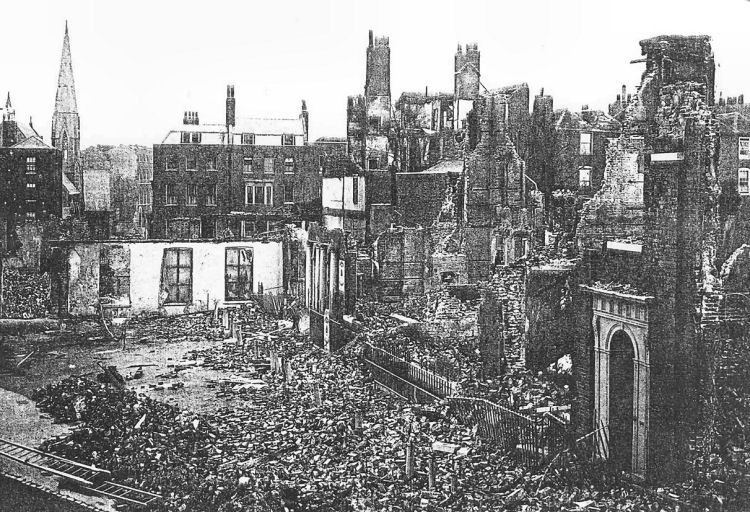
Above photo showing the remains of the Assembly Rooms, 1882. |
At the end of November 1882 it was reported that the proprietors of the
"Royal Hotel" and Assembly Rooms had decided to rebuild their premises, in
red brick. This, however, seems to have been just a rumour since in January
1883 it was suggested that the proprietors were likely to sell the site:
|
From the
https://www.margatelocalhistory.co.uk accessed 11 January 2021.
It is reported that Mr H. E. Davis, who has offered to the
directors of the "Royal Hotel" and Assembly Rooms Company the sum of
£2,000 for the site of its late premises which were consumed in the
conflagration of October 27-28th last, and has subsequently increased
his offer to £2,300, has now made an alternative offer, whereby he
proposes to sell his interest in the lease of the destroyed premises
for £1,000. It is anticipated that this offer on his part to sell
out his interest will be accepted. Thirty-four architects have, we
believe, sent in plans to the proprietors of the Hotel and Assembly
Rooms, in response to their invitation for plans to be supplied
gratuitously. The chances are that in the event of the company
accepting Mr. Davis’s offer to sell them his lease they will not
re-build, but that the site will come to the hammer, and a large
portion of it, it is to be hoped, may be purchased by the
Town-council for the improvement of Cecil-square. The widening of
Queen-street at the expense of the Tramways Company seems to be a
contingency of a very remote character, but now that it is possible,
and if rumour is true, even probable that Mr F. C. Cobb will not
re-build his premises, the opportunity for widening Queen-street and
squaring Cecil-square is one that may never occur again. |
The drinks license of the "Royal Hotel" hadn't lapsed, but to keep it
live, a temporary building or ‘shanty’ was built on the vacant land, and was
renewed each year.
The vacant plot in front of the rebuilt Assembly Rooms and the shanty of
Cecil Square are shown below, dating from circa 1883.
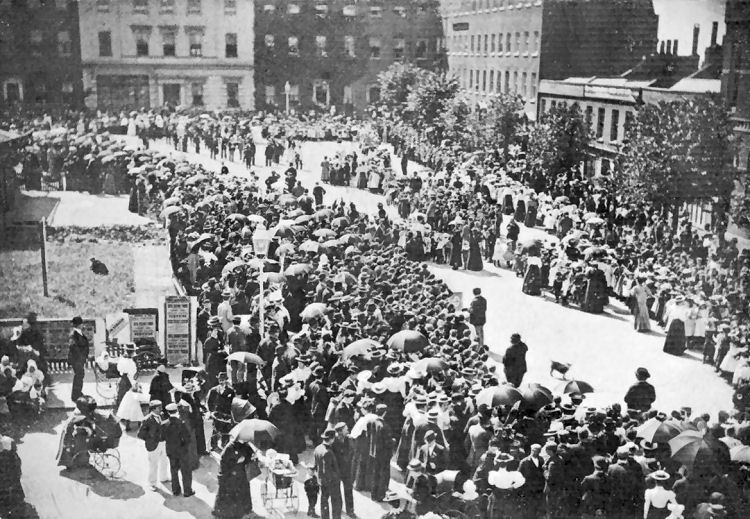
Above photograph showing a ceremony in Cecil Square, circa 1883, on
the left is the vacant plot in front of the former Assembly Rooms
where the "Shanty" would have been set up. |
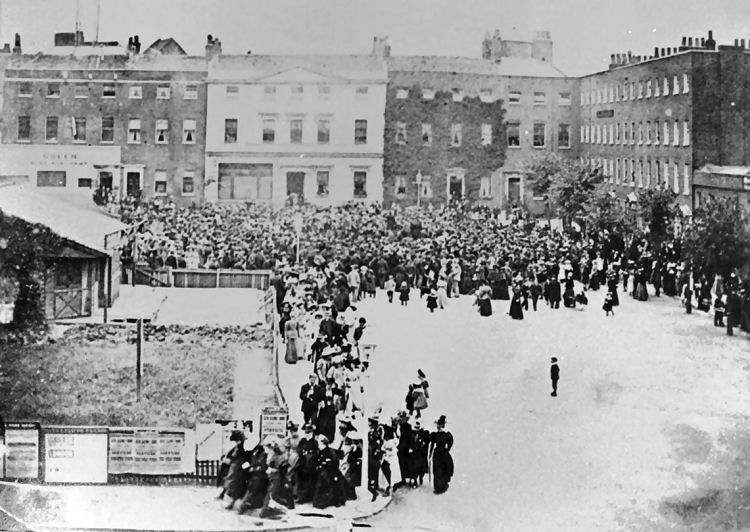
I believe the building on the left was the "Shanty" building. |
The grounds were again put up for auction in 1896 and the purchaser was a
newly formed partnership planning a chain of playhouses along the south
coast, that of H. H. Morrell and Frederick Mouillot. They quickly went about
a major rebuild, renaming the Assembly Rooms the New Grand Theatre, and
later went on to gain a license for the performance of stage plays. The New
Grand opened in August 1898.
Although it had been the intention of Morell and Mouillot to rebuild the
"Royal Hotel," the Town Council persuaded them to sell the land to the them
as they wished to widen Cecil Square. Morell and Mouillot planed to use the
money they got from selling the land to build a colonnade along the Cecil
Square side of the Theatre, with a bar opening into the colonnade. This
plan, depended on the drinks licence held by the old "Royal Hotel" being
transferred to the Grand Theatre. Morell and Mouillot went ahead with the
work, believing they had the promise of the Council to transfer the licence,
but the Council went back on its agreement, and Morell and Mouillot had
finally to go to court to get the licence.
|
From the
https://www.margatelocalhistory.co.uk accessed 11 January 2021.
LICENSING AT MARGATE.
The case of Morell v the Margate Licensing Justices came on for
hearing on Tuesday at the East Kent Quarter Sessions, Canterbury.
When Messrs Morell and Mouillot purchased the Royal Assembly Rooms,
Margate, they bought with them the whole of the site of the old
"Royal Hotel" and Assembly Rooms, destroyed by fire in 1882, together
with the licence which had been attached to the property for over
100 years. To keep the licence alive, on what was left as vacant
enclosed land when the New Assembly Rooms were built, a “shanty"
was erected, and the licence renewed year after year, until the last
Licensing Session in September, when Messrs Morell and Mouillot were
met with unexpected opposition. It had originally been intended to
build a hotel on the vacant site, but they were approached by the
Margate Town Council, who were desirous of effecting an improvement
by the widening of Cecil-square, and long negotiations ended in
Messrs Morell and Mouillot disposing of their land for £2,000,
which sum they agreed to spend, and have actually employed, in the
building of a colonnade on the Cecil-square side of the theatre. On
their part, however, they made it a condition of the sale that the
licence should be renewed to them, and that they should be allowed
to open a buffet bar, shown on the plan passed by the Council, with
doors opening on to the footway under the colonnade. On the
assurance that the renewal of the licence was assured, as the
members of the Council and the Licensing Committee were practically
the same (although, of course, the latter could not pledge the
Licensing Committee to any line of action), negotiations were
concluded, and the contract entered into and their land was thrown
into the square. Messrs Morell and Mouillot made the bar entrances,
and then were met with the statement that as the land had been sold
to which the licence had been attached — they already had the usual
limited licence for the interior bars of the theatre — and as it was
not intended to build a hotel there, the licence was no longer
needed, and the committee refused to renew it. Against this Messrs
Morell and Mouillot appealed. Mr. Kisch, barrister, appeared for the
appealants, and Mr. Hohler for the respondents. Evidence was given by
Mr. Mouillot and the Mayor of Margate, who corroborated the
statement that the renewal of the licence was to be a condition
precedent to the sale of the land. After a hearing lasting six hours
his Honour, Judge Sir W. L. Selfe, said the committee had come to
the almost unanimous conclusion that the appeal should be allowed
and the licence renewed, with costs against the Corporation. An
application to his Honour to state a case was refused. |
LICENSEE LIST
BENSON & SMITH 1779+
BENSON John 1792-96+
KIDMAN Benjamin 1801-Nov/10
HOWEFrancis Nov/1810+
IRISH ----- Mr to Mar/1811 dec'd (Tap)
HOWE Francis 1823-33+


GARDINER Thomas 1845-67+ (age 43 in 1861 ) )
VILLIERS Rosa 1871+ (age 37 in 1871 ) )
COLLINS Isabella 1881+ (age 36 in 1881 ) )
Royal Hotel Tap.
ARLIAS Samuel 1823+
MOORE Thomas 1851+
 From the Pigot's Directory 1832-33-34 From the Pigot's Directory 1832-33-34
 Census Census
|













